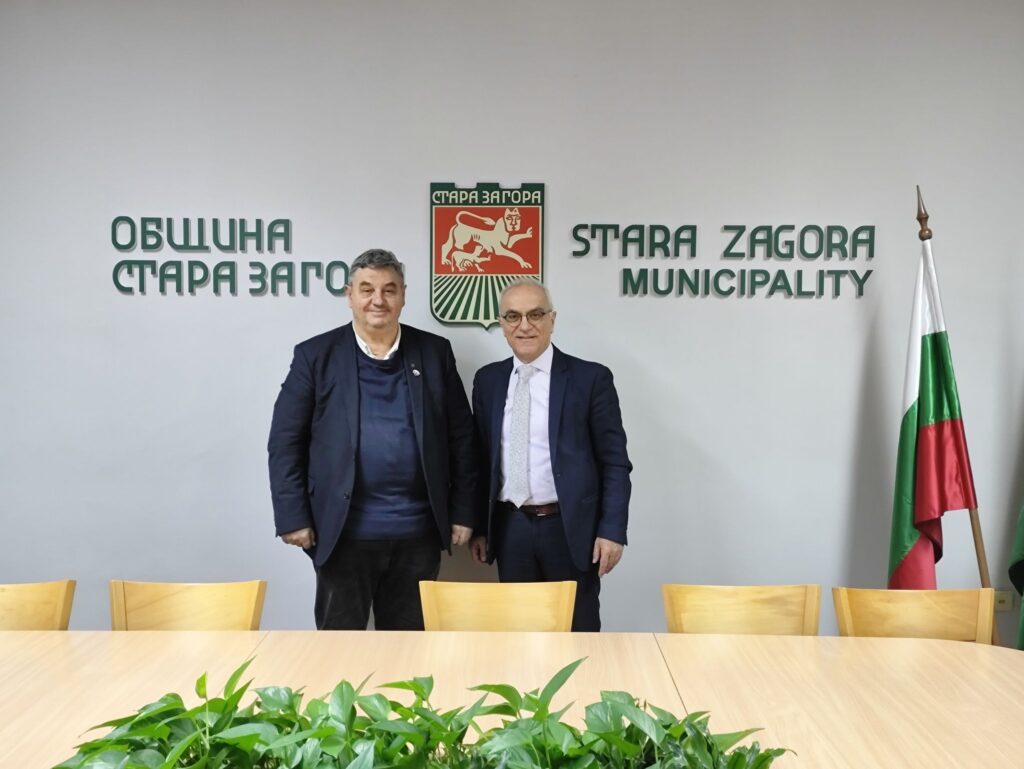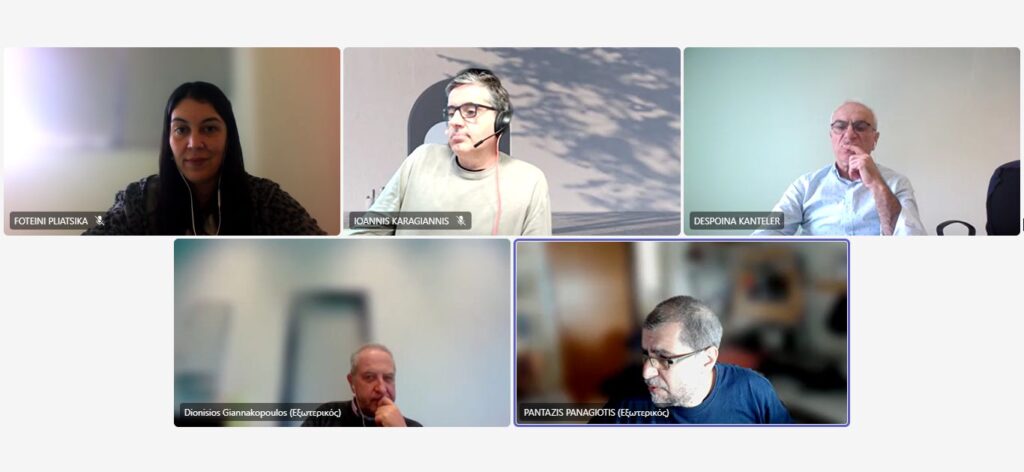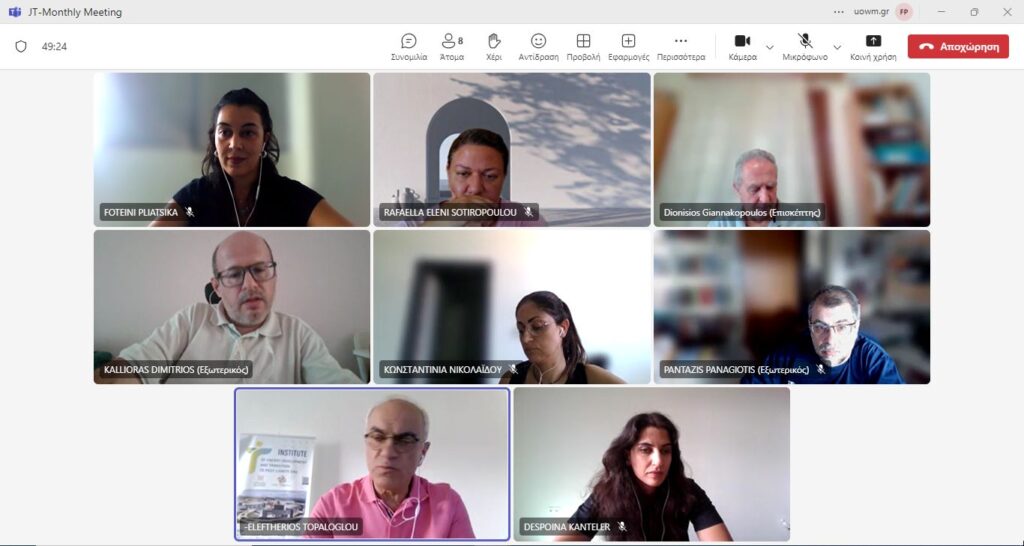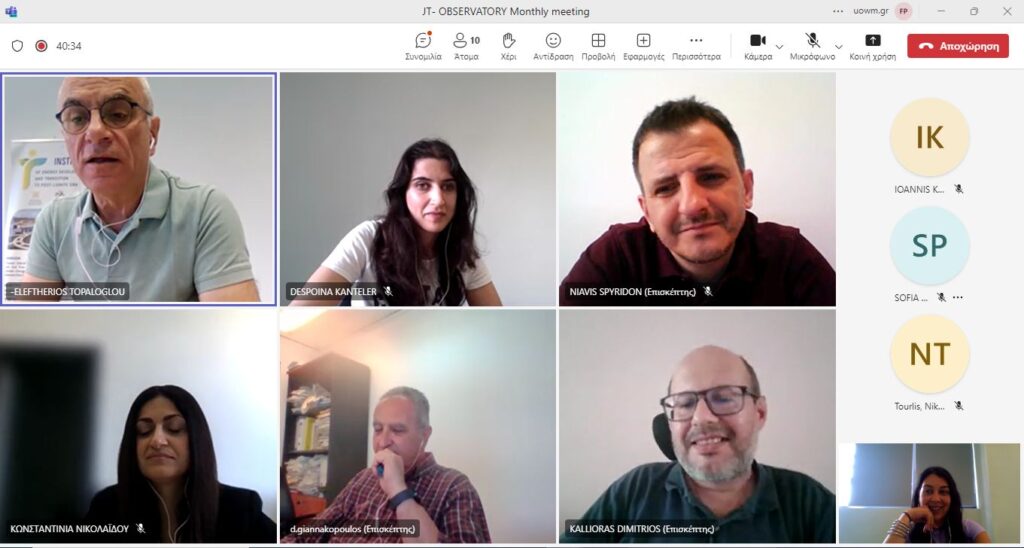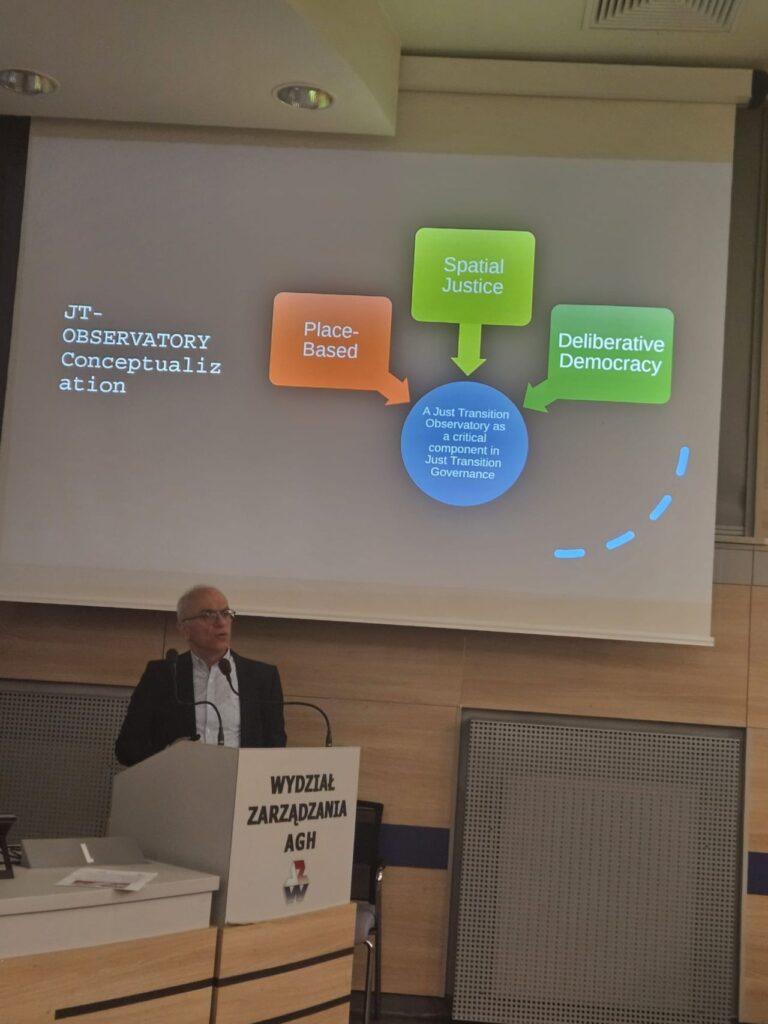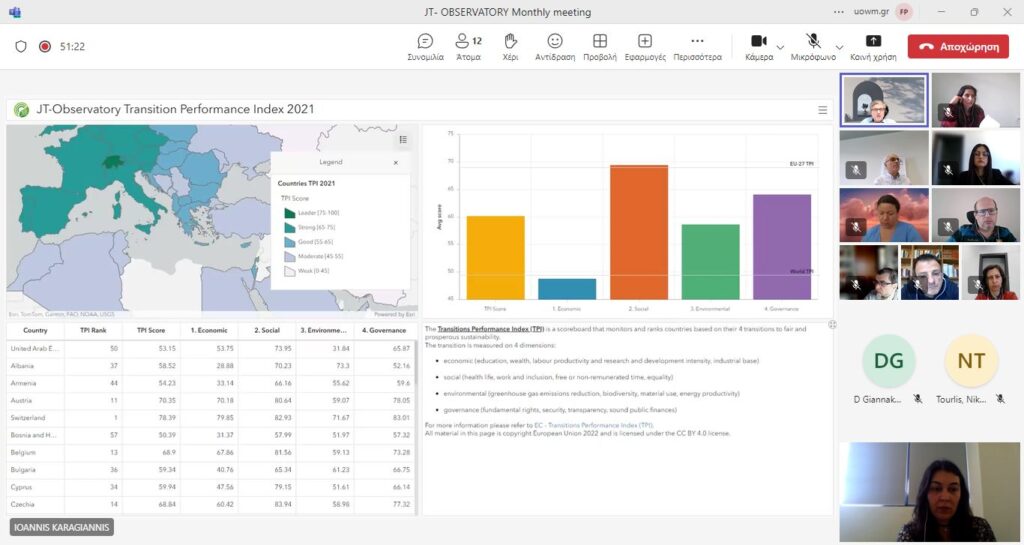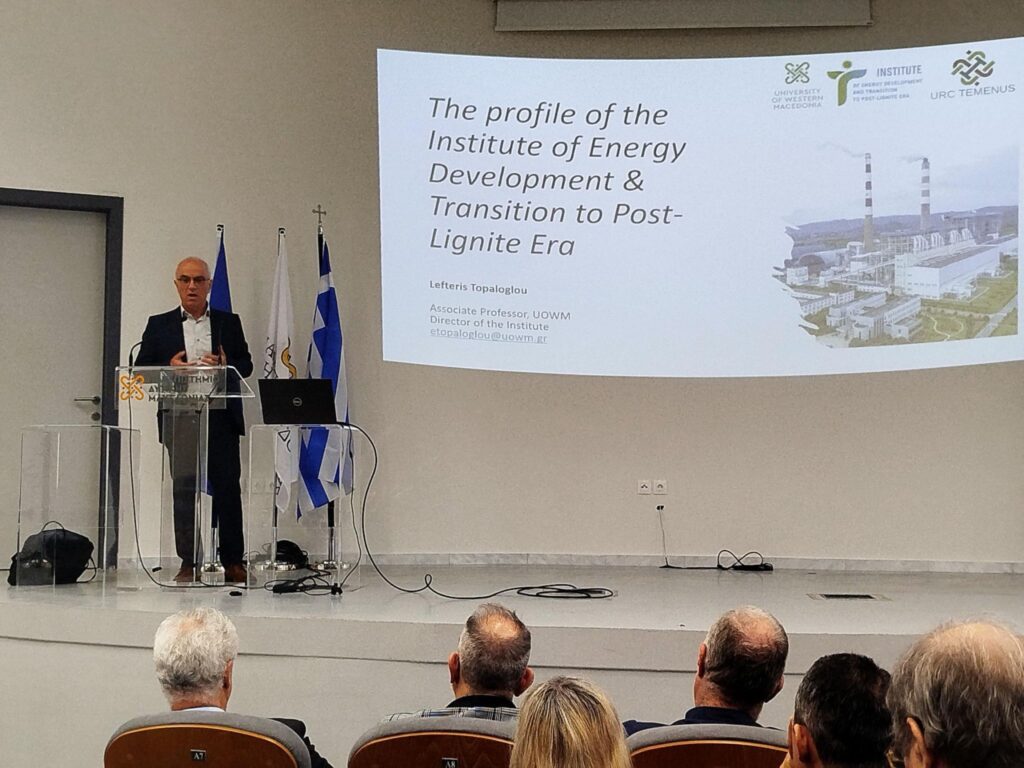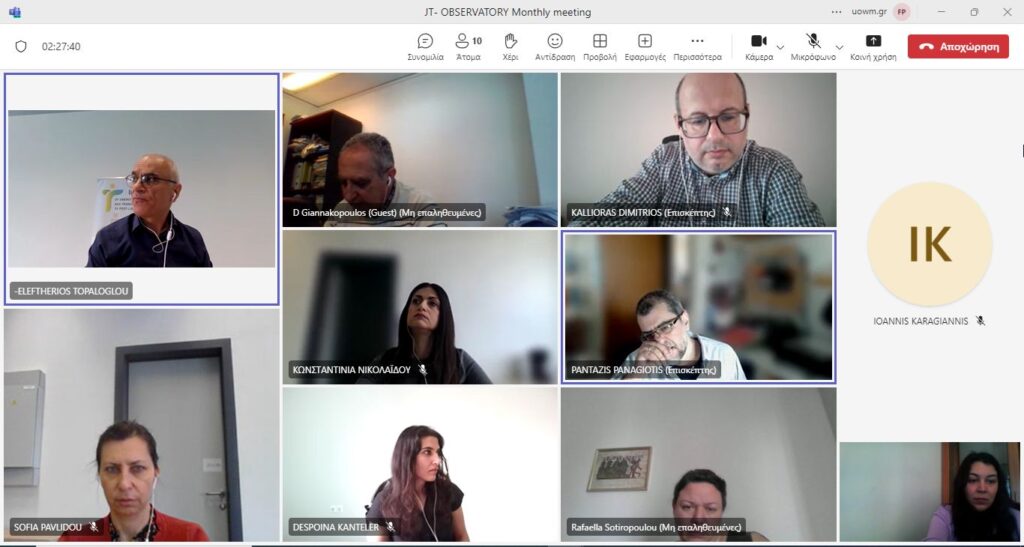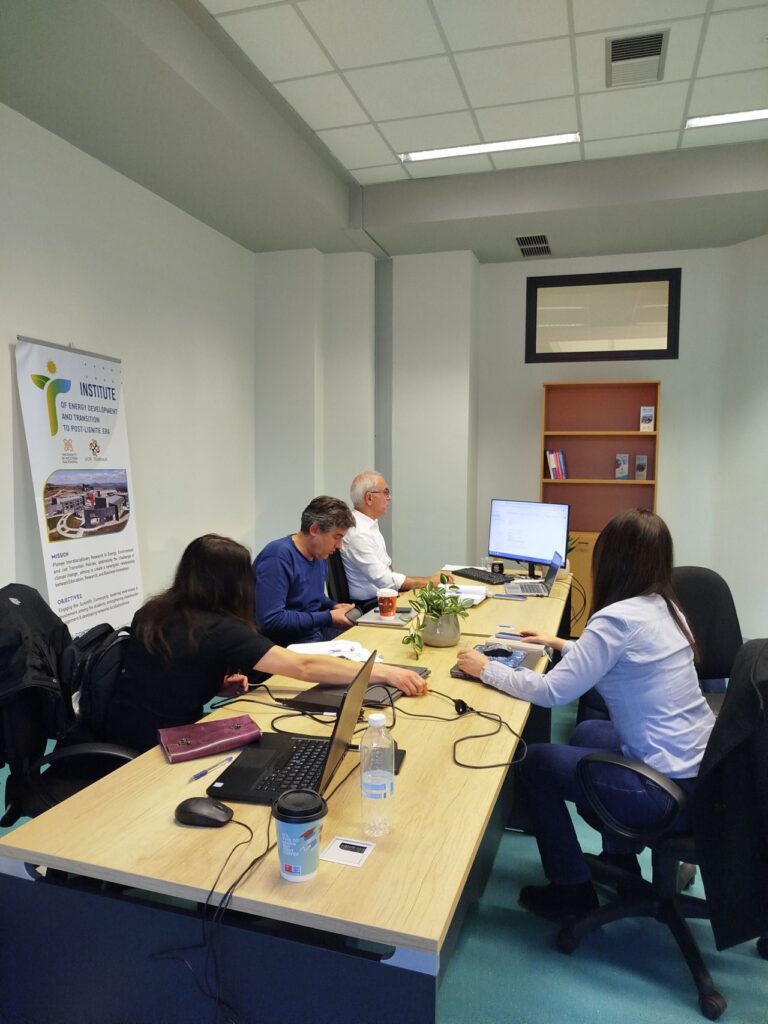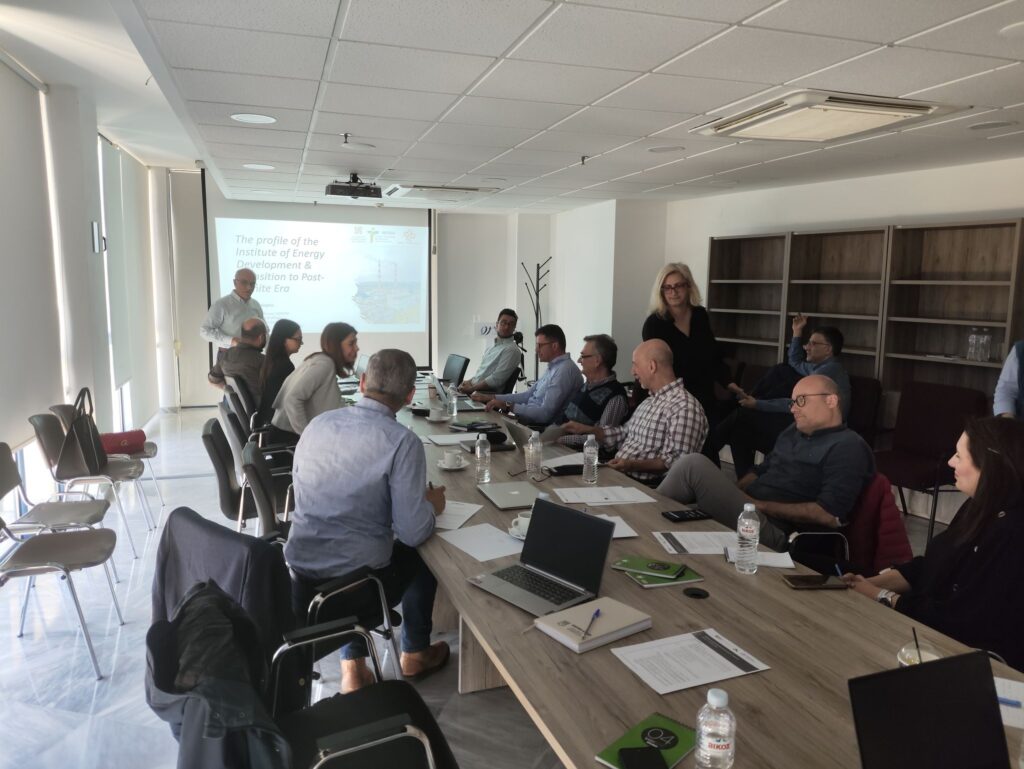ENTRA Lab’s Field Research for the JT-Observatory starts in Bulgaria
The ENTRA Lab started the field research in Bulgaria as part of the Just Transition Observatory (JT Observatory) project. From November 18th to 20th, the ENTRA Lab team, led by Dr. Despoina Kanteler, PhD Candidate Fenia Pliatsika, and Associate Professor Dr. Lefteris Topaloglou, Director of ENTRA Lab, conducted extensive research in Stara Zagora, yielding valuable insights into the just energy transition process. During this mission, the team conducted 19 in-depth interviews with experts, gaining crucial perspectives on the challenges and opportunities of just transition in Bulgaria. This research was made possible through the invaluable support of the Stara Zagora Regional Economic Development Agency (SZREDA) and its exceptional Director, Dr. Rumyana Grozeva, whose leadership played a key role in the success of the mission. Special recognition goes to the SZREDA team, including Byliana for translating the online questionnaire, Tea Turlakova for organizing high-level meetings, and Gabriela, Antoaneta Zheleva, Anna, Vasil Demirev, Petia, and Remina Aleksieva for their dedication and support. We also extend our gratitude to key stakeholders, including Georgi Simeonov, Oleg Stoilov, Temenujka Sotirova, Plamen Barakov, Prof. Ivan Varlyakov, Prof. Boryana Paraskevova, and Assoc. Prof. Nedelina Kostantinova, for their valuable contributions. Following the successful visit to Stara Zagora, the ENTRA Lab team continued its research efforts in Sofia, engaging with key stakeholders to further explore just transition governance. In Sofia, the team held insightful discussions with Snezhina Gabova and Antoniya Novakova from the Sofia Development Association, interviewed legal and green strategy expert Martin Mintchev, and engaged with energy transition professional Boyan Mitrakiev. This field research mission in Bulgaria highlights ENTRA Lab’s commitment to advancing research and fostering collaborations that drive sustainable and equitable energy transition policies. The insights gained will significantly contribute to the ongoing development of the JT Observatory project and its role in shaping just transition strategies. Stay tuned for more updates as we continue our work towards a more sustainable future!
Advancing Field Research: JT-Observatory Meeting on Expert Questionnaires
On October 23, 2024, the Just Transition Observatory (JT-Observatory) team held a significant meeting dedicated to finalizing the expert questionnaires for our upcoming field research in Greece, Poland, and Bulgaria. As the research phase approaches, this meeting played a crucial role in aligning our strategies and refining our approach to gathering valuable insights from key stakeholders. The questionnaires are designed to engage experts in the field of energy transition, including researchers, public sector representatives, business leaders, and other key actors involved in just transition processes. This step marks an important milestone in our project, ensuring that our research tools are comprehensive, well-structured, and capable of capturing the perspectives and expertise necessary to drive meaningful policy recommendations. Exciting times lie ahead as we move closer to launching our fieldwork, which will provide essential knowledge to support a fair and inclusive transition to a carbon-neutral future.
JT-Observatory Monthly Meeting: Preparing for Field Research
Today, the scientific team at the Just Transition Observatory (JT-Observatory) gathered for a highly productive meeting, marking a significant step toward the next phase of the project—field research. As we near the completion of our comprehensive literature review, the team is now focused on preparing the tools and methods needed to conduct research in three regions significantly affected by the energy transition. The meeting featured in-depth discussions on the research methods that will be employed, including questionnaires, interviews, and focus groups. These research activities will be conducted in three key regions: Western Macedonia, GreeceSilesia, PolandStara Zagora, Bulgaria In the coming weeks, the team will travel to Poland to kick off this critical fieldwork. Research tools are currently being finalized and tested to ensure the highest standards of data collection and meaningful insights. This field research is crucial for understanding the socio-economic impacts of the energy transition in these carbon-intensive regions and will provide vital information to support a just, fair, and inclusive future. The JT-Observatory project is committed to ensuring that the transition to a carbon-neutral society benefits all regions and their communities.
JT-Observatory Monthly Meeting: Advancing Key Deliverables for a Just Transition
On June 3, 2024, the team behind the Just Transition Observatory (JT-Observatory) gathered for another productive monthly meeting. The session centered on significant progress with Deliverables 2.1 and 2.2, marking key milestones for the project’s development as it continues to explore the vital aspects of the just energy transition. Deliverable 2.1: Energy Transition, Place-Based Approach, and Spatial Justice The meeting began with a deep dive into Deliverable 2.1, which focuses on the intersection of energy transition, place-based approaches, and spatial justice. The team engaged in a comprehensive literature review and synthesis to better understand how place-based policies can address the diverse challenges posed by the energy transition. The insights gained from this review will play a critical role in shaping the project’s approach to energy governance, ensuring that policies are not only effective but also equitable. Deliverable 2.2: Climate Change and Just Transition Policies in Carbon-Intensive EU Regions Next, the focus shifted to Deliverable 2.2, which examines climate change and just transition policies in carbon-intensive EU regions. The team discussed the current landscape of transition policies across the EU and how they can be tailored to the specific needs of regions that are heavily reliant on carbon-intensive industries. This analysis will be integral to the project’s upcoming field research, which aims to explore real-world applications of these policies and their effectiveness in promoting a just transition. Upcoming Steps: Field Research and Research Methodology Looking ahead, the team outlined the next steps for the project, with a particular focus on preparing for the crucial empirical study that will inform the field research. The discussions centered on the research methods to be integrated into the fieldwork, ensuring that the study will be comprehensive, rigorous, and impactful. The team is committed to ensuring that the findings from the field research will provide policymakers with valuable insights to support the transition to a carbon-neutral and socially just future. As the JT-Observatory project moves forward, these important discussions and developments continue to drive the initiative’s mission to facilitate a fair and inclusive energy transition.
JT-Observatory Presented at Dr. Lefteris Topaloglou’s Lecture at AGH University of Krakow
Dr. Lefteris Topaloglou, Head of the Energy Transition & Development Transformation Laboratory (ENTRA Lab) at the University of Western Macedonia, recently had the privilege of visiting AGH University of Krakow to present the Just Transition Observatory (JT-Observatory) project. This visit provided a wonderful opportunity to share the vision and goals of the project with an esteemed academic audience and to strengthen the collaboration between the University of Western Macedonia and AGH University. Funded by the Hellenic Foundation for Research and Innovation (ΕΛΙΔΕΚ - HFRI) for the next two years, the JT-Observatory project focuses on exploring the impact of place-based approaches, spatial justice, and deliberative democracy on the governance of the energy transition. The project will involve five doctoral dissertations, each examining how these concepts can contribute to more just and inclusive energy transition processes. The visit to AGH University was particularly significant as AGH is a valued partner in this initiative, supporting field research in Poland's Silesia region. The project also includes research in Bulgaria's Stara Zagora region and Western Macedonia. Dr. Topaloglou expressed his deep appreciation for the support of his dear friend, Prof. Joanna Kulczycka, AGH's Deputy Dean for Development and Cooperation, for her unwavering commitment to the success of the project. This lecture and visit mark a critical step in preparing for the field research that will help guide future policies for a fair and inclusive energy transition, with the valuable contributions of AGH University.
Monthly Meeting of the JT-Observatory: Advancing Deliverables for a Just Transition
On April 29, 2024, the team behind the Just Transition Observatory (JT-Observatory) gathered for the monthly meeting, focusing on the progress of Deliverables 2.1 and 2.2. These deliverables represent crucial steps in the development of the JT-Observatory project, which aims to foster an inclusive, evidence-based approach to the just transition process. Deliverable 2.1: Co-design of the JT-OBSERVATORY Conceptual Framework During the meeting, the team delved into Deliverable 2.1, which involves the co-design of the JT-Observatory conceptual framework. This foundational task focuses on defining key categories, research questions, and policy inquiries. These elements are essential for bridging the diverse disciplines and policy-making realms involved in the just transition process. The co-design process ensures that both theory and practice are brought together in a way that can guide impactful decisions and support a fair and sustainable transition. Deliverable 2.2: Methodology for Reviewing and Analyzing Just Transition Policies The team also reviewed progress on Deliverable 2.2, which focuses on the methodology for reviewing and analyzing just transition policies. This deliverable aims to provide a structured approach to analyzing policies at EU, national, and regional/local levels. The methodology includes guidelines for desk research and stakeholder mapping, ensuring a thorough review process that will inform effective, evidence-based decision-making. As part of the meeting, the JT-Observatory team reaffirmed its commitment to blending cutting-edge literature with practical policy implementation. The work being done is crucial for advancing conversations on energy transition, spatial justice, and place-based governance in the context of climate change and the drive toward carbon neutrality. The JT-Observatory continues to make significant strides toward creating a comprehensive framework that will support policymakers in addressing the challenges of a just transition.
JT-Observatory Presented at JustReDI Dialogue Forum
Recently, the University of Western Macedonia organized a dialogue forum as part of the JustReDI initiative, focusing on the climate crisis and green transition. The event aimed to engage social partners and citizens in discussions about the social impacts of the climate crisis and digital transformation, offering a platform for exchange of ideas and collaboration on pressing issues. During the forum, Dr. Lefteris Topaloglou, Associate Professor and Director of the Institute of Energy Development & Transition to the Post-Lignite Era, presented a range of projects, with a special focus on the Institute's innovative work. Dr. Topaloglou emphasized the university's proactive response to the challenges posed by the changing production model in the region. One of the key highlights was the presentation of the Just Transition Observatory (JT-Observatory), a pioneering project developed by the Institute in collaboration with the Energy Transition & Development Transformation Laboratory – ENTRA Lab. The JT-Observatory aims to provide scientific support to policymakers, ensuring that decisions are made based on accurate data and methodologies, aligning with the goals of a just and sustainable transition. Additionally, Dr. Topaloglou presented other significant projects being implemented by ENTRA Lab, which contribute to the broader objectives of sustainable development and green transformation. The projects are designed to help guide the region through the necessary steps of energy transition and ensure that the social, environmental, and economic impacts of the transition are carefully considered. The JustReDI initiative is coordinated by the National Center for Social Research and involves partnerships with prestigious research centers, including "ATHENA," the National Observatory of Athens, the Hellenic Center for Marine Research, the University of Western Attica (UNIWA), and the International University of Greece. The successful presentation of the JT-Observatory and other ENTRA-Lab projects highlights the critical role of research and scientific collaboration in addressing the challenges of the climate crisis and ensuring a sustainable future for all.
JT-OBSERVATORY 2nd Meeting: Advancing Governance for a Just Energy Transition
On April 1, 2024, the Energy Transition & Development Transformation Laboratory (ENTRA Lab) team convened for the 2nd meeting of the JT-OBSERVATORY – Just Transition Observatory, further deepening our understanding of the challenges and opportunities in the transition towards low-carbon and net-zero economies. The discussions emphasized the critical need for public support, the development of new business models, and the implementation of innovative governance practices to address the multifaceted challenges of the climate crisis. A key focus was the evolving governance landscape, highlighting the importance of multi-level interactions and stakeholder engagement in ensuring a just and effective transition. Building on cutting-edge research, we are developing a comprehensive framework to guide our efforts, integrating principles of spatial justice and place-based governance. Special attention is given to coal regions undergoing decarbonization, particularly in Greece, Poland, and Bulgaria, ensuring that policy interventions align with local knowledge and foster inclusivity. By addressing spatial imbalances and promoting sustainable development, JT-OBSERVATORY is committed to shaping governance strategies that facilitate a fair and equitable energy transition. Today’s meeting was enriched with insightful presentations and discussions, paving the way for stronger collaboration and impactful research. Stay tuned for more updates as we continue this critical work!
ENTRA Lab Internal Meeting for the JT-Observatory Project: Advancing Just Transition Research
On March 21, 2024, the Energy Transition & Development Transformation Laboratory (ENTRA Lab) team held a productive internal meeting to discuss key deliverables for Work Package 2 (WP2) of the JT-OBSERVATORY project. During this session, the team conducted a thorough review of energy transition policies at the EU level, analyzing scientific perspectives on spatial justice and place-based governance. A strong focus was placed on consolidating the knowledge platform, integrating cutting-edge literature, and examining policy implementation to enhance the understanding of climate change and carbon neutrality. As the project progresses, ENTRA Lab is dedicated to co-designing the JT-OBSERVATORY conceptual framework, refining methodologies for reviewing just transition policies, and extracting meaningful insights to support ongoing research. Stay tuned for more updates as we continue working towards a fair and sustainable energy transition!
JT-Observatory Project Presented at Event Organized for Horizon Project SITRANS -Carbon Intensive Regions in Transition – Unravelling the Challenges of Structural Change
On March 4, 2024, the Institute of Energy Development & Transition to the Post-Lignite Era, represented by Dr. Lefteris Topaloglou, participated in an important event hosted by the Regional Development Fund of Western Macedonia. The event was part of the Horizon program "Carbon Intensive Regions in Transition - Unravelling the Challenges of Structural Change - SITRANS" and focused on disseminating the results of the CINTRAN project and promoting networking with related initiatives under the title “SITRANS: Dissemination of Results & Networking with Related Initiatives." The event provided a valuable opportunity to showcase the outcomes of the SITRANS project, which centered around the four fundamental principles for a Just Transition. A significant highlight was the presentation of the innovative tool JT:READY, developed within the project framework, designed to facilitate the transition process. Our Institute played an active role in the event, with Dr. Lefteris Topaloglou presenting the mission of the Institute and unveiling the JT-Observatory project. The JT-Observatory is an ambitious initiative that aims to track and support the Just Transition process, ensuring that the challenges and opportunities of the transition to a post-lignite era are addressed in a sustainable and inclusive manner. Kudos to all the organizers and participants for making this event a success, as it helped highlight the importance of collaboration in shaping a sustainable future for carbon-intensive regions.

